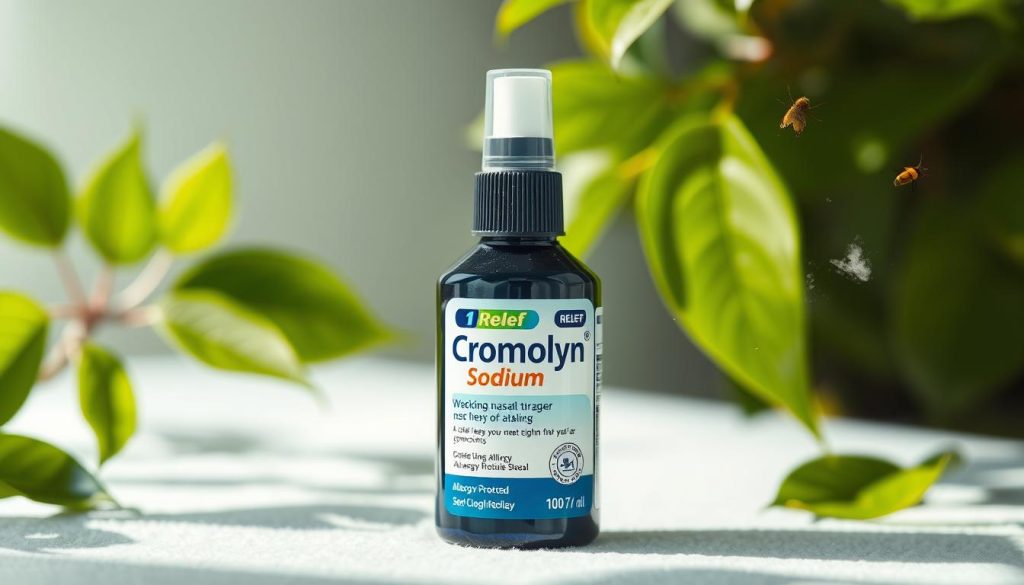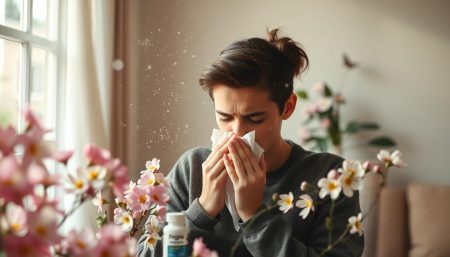When spring or fall comes, many people start looking for seasonal allergy relief. They face a tough battle against allergic rhinitis, also known as hay fever. This condition doesn’t just make you uncomfortable; it can mess up your whole day.
This article is here to offer hope and real allergy treatment solutions. We want to help you deal with the real effects of this condition.
Symptoms of allergic rhinitis can range from a simple sneeze to a complete blockage of your nose. But don’t worry, fighting hay fever is not alone. We’re here to guide you through the many treatment options. We’ll look at each one carefully, with understanding and lots of knowledge.
Get ready to take back your comfort and confidence. We’ll explore therapies that offer more than just temporary relief.
Key Takeaways
- Exploration of proven allergic rhinitis treatments offering tangible benefits.
- Empathetic approach to the daily challenges faced by allergy sufferers.
- Overview of medical solutions for sustainable seasonal allergy relief.
- Insights into allergy treatment solutions that effectively combat hay fever.
- Empowerment through informed choices in managing allergic rhinitis.
Understanding Allergic Rhinitis and Its Impact on Daily Life
Allergic rhinitis is a common condition that affects millions worldwide. It’s caused by an overreaction to certain allergens in the environment. This reaction leads to inflammation in the nasal passages, causing discomfort.
Hay fever is a major trigger for allergic rhinitis. The impact of hay fever can be severe, affecting daily life and quality of life. People often experience symptoms like sneezing, nasal congestion, itchy eyes, and a persistent cough.
Those with allergic rhinitis face challenges in their social and professional lives. Symptoms can come and go without warning. This unpredictability can lead to missing work and avoiding social events, making people feel isolated.
- Reduction in Productivity: Many report a significant decrease in concentration and output at work.
- Sleep Disruption: The discomfort of chronic nasal inflammation often leads to difficulty sleeping, which compounds fatigue and affects overall health.
- Social Withdrawal: The embarrassment or discomfort of symptoms often causes sufferers to withdraw from social engagements, impacting mental health.
Understanding allergic rhinitis and its effects is key to better management and empathy. It highlights the need for proper diagnosis and effective treatment. This can greatly improve the lives of those dealing with this chronic condition.
Key Symptoms and Diagnosis of Allergic Rhinitis
Identifying allergic rhinitis means spotting its common signs. These include constant sneezing, stuffy nose, itchy eyes, and frequent headaches. These symptoms can really mess up your day. That’s why getting a professional diagnosis is key to finding the right treatment.
Allergy testing is crucial for diagnosing allergic rhinitis. Doctors use skin prick tests and specific IgE blood tests. These tests show if you have antibodies against certain allergens, helping figure out what causes your symptoms.
| Allergy Test | Description | Common Allergens Tested |
|---|---|---|
| Skin Prick Test | A small amount of suspected allergens are placed on the skin, usually the forearm, and the area is pricked to allow the allergen to enter the skin, looking for signs of an allergic reaction. | Pollen, dust mites, pet dander, mold |
| Blood Test | Measures the amount of IgE antibodies in the blood in response to specific allergens, useful for those who cannot undergo skin tests. | Food, pollen, mold, dust mites |
Getting a professional diagnosis of allergies is important. It leads to making a plan that’s just right for you. This plan might include avoiding certain allergens, taking medicine, or other treatments. The aim is to improve your life with treatments that fit you.
Getting an accurate diagnosis is not just for relief from symptoms. It also helps avoid getting worse. That’s why allergy testing is so important. Working closely with doctors, you can manage allergic rhinitis well. Knowing the symptoms and getting medical help early can help treat these issues effectively.
The Role of Antihistamines in Managing Allergic Rhinitis
Antihistamines are key in fighting allergic rhinitis. They help by reducing allergy symptoms in different forms. Knowing how they work helps people choose the best option for their health.
Types of Antihistamines Available
There are two main types of antihistamines for allergic rhinitis: over-the-counter antihistamines and prescription antihistamines. Over-the-counter options like Loratadine and Cetirizine are easy to find and work well for many. Prescription antihistamines, such as Levocetirizine or Desloratadine, are for more serious cases or when over-the-counter ones don’t help.
How Antihistamines Provide Relief from Allergic Rhinitis
Antihistamines block histamine reactions in the body. This is what causes allergy symptoms like sneezing and a runny nose. By stopping histamine, antihistamines lessen these symptoms, offering relief. Both over-the-counter and prescription antihistamines can be effective, depending on the severity of symptoms.
Potential Side Effects and Considerations
Antihistamines are usually safe but can cause side effects like drowsiness and dry mouth. Knowing these side effects helps in picking the right antihistamine. Always talk to a healthcare provider before starting any new medication, especially if you have other health issues or take other drugs.
| Antihistamine Type | Common Brands | Usually Recommended For | Potential Side Effects |
|---|---|---|---|
| Over-the-counter | Loratadine, Cetirizine | Mild to moderate symptoms | Drowsiness, Dry mouth |
| Prescription | Levocetirizine, Desloratadine | Severe symptoms | Dizziness, Fatigue |

Nasal Corticosteroids: A Potent Option for Treatment
Nasal corticosteroids are highly recommended for controlling allergic reactions in patients with allergic rhinitis. These treatments are effective because they reduce inflammation. This is key in easing symptoms of allergic rhinitis.
One of the best ways to use these corticosteroids is through nasal spray treatment. This method applies the treatment directly to the area with inflammation. It leads to faster relief and fewer side effects compared to other medications.
- Nasal corticosteroids alleviate nasal blockage and itching.
- They are less likely to cause drowsiness or other common side effects associated with oral medications.
- Regular use can lead to significant inflammation reduction, improving overall quality of life.
Nasal corticosteroids are not only effective for short-term relief but are also safe for long-term use. They are a key part of treating controlling allergic reactions. Their ability to target the immune response precisely at the source makes them a staple in managing allergic rhinitis.
It’s crucial to consult healthcare professionals to tailor the treatment. This ensures proper use without over-reliance on the medication. It also helps understand any potential interactions with other treatments being used.
Allergic Rhinitis Treatments: Decongestants and Their Usage
Decongestant nasal sprays and oral decongestants are key in managing allergic rhinitis symptoms. They help relieve nasal congestion and improve airflow. Knowing how they work and when to use them is crucial for relief.
Understanding How Decongestants Work
Decongestants shrink blood vessels in the nasal passageways. This reduces swelling and congestion. It makes breathing easier and lessens nasal discomfort.
Short-Term Versus Long-Term Use of Decongestants
Decongestants are great for quick relief but can cause problems with long-term use. Using nasal sprays too long can lead to rhinitis medicamentosa. This makes nasal congestion worse when you stop using the medication.
To manage symptoms well, use decongestants only as directed by a doctor. Look for other treatments for long-term relief. This way, you get relief without risking dependency or side effects.
Immunotherapy: A Long-Term Solution for Allergy Sufferers
Many people with allergies look for lasting solutions. Immunotherapy, including allergy shots and sublingual treatments, is key. It helps build up a tolerance to allergens, offering hope for long-term relief.
Subcutaneous Immunotherapy (SCIT) Explained
SCIT, or allergy shots, is a common treatment. It helps the body get used to allergens over time. Small amounts of allergens are injected, making the body less reactive.
Regular sessions are important. They help the immune system learn to handle allergens better.
Sublingual Immunotherapy (SLIT): An Alternative Approach
SLIT is for those who don’t like needles or want an easy treatment. It involves placing a tablet under the tongue daily. This method is simple and can be done at home.
Both treatments aim to change how the immune system reacts to allergens. They can turn severe allergies into minor issues, offering long-term relief.

Seeking allergy relief through immunotherapy shows medicine’s progress. It gives people a chance to regain their health and comfort. The path to desensitization is long, but the promise of lasting relief makes it worth it for those with chronic allergies.
Mitigating Symptoms with Saline Nasal Rinses
Nasal irrigation is a natural way to manage allergies. It uses a saline solution to clean out irritants and moisturize the nose. This helps calm down inflamed tissues.
Saline nasal rinses are easy to use and very effective. They help clear out congestion, pollutants, and allergens. Regular use can reduce the need for medicines.
A study shows how well saline nasal rinses work. It found they improve nasal symptoms and quality of life for adults and kids. This makes them a good addition to allergy treatment plans.
| Benefits | Method of Use | Frequency Recommended |
|---|---|---|
| Reduces nasal congestion and allergens | Use distilled or sterile water mixed with salt | Daily or twice daily |
| Improves mucociliary function | Tilt the head and pour solution into one nostril, letting it drain from the other | As needed during allergy season |
| Decreases the need for medications | Use isotonic or hypertonic solutions as per comfort | Regularly during episodes of severe symptoms |
Adding saline nasal irrigation to your daily routine can help a lot. It’s a key part of managing allergies naturally. It helps keep your nose healthy, reduces allergic reactions, and improves your overall health.
Leukotriene Inhibitors: A Targeted Approach to Treatment
Leukotriene inhibitors, like montelukast, are a big step forward in treating allergies. They target specific pathways that cause allergy symptoms. This makes them a focused way to ease symptoms.
The Science Behind Leukotriene Inhibitors
Leukotriene receptor antagonists block leukotrienes, which are immune system chemicals released during allergies. By stopping these chemicals, montelukast reduces inflammation and mucus. It’s very effective for asthma symptoms caused by allergies.
Benefits and Limitations of Leukotriene Inhibitors
Montelukast is great for reducing respiratory symptoms in allergic rhinitis and asthma. But, it might not work for everyone. This shows how different people react to the same treatment.
| Benefits of Montelukast | Limitations of Montelukast |
|---|---|
| Reduces inflammation | May require combination with other medications |
| Decreases frequency of asthma attacks | Not suitable for immediate relief of symptoms |
| Improves nasal airflow | Varied responses in patients |
Knowing how montelukast works and its pros and cons helps a lot. It helps both individuals and doctors manage allergies better.
The Protective Effects of Cromolyn Sodium in Allergic Rhinitis
In the field of allergy symptom prevention, Cromolyn Sodium stands out as a key non-steroidal treatment. It’s given as a nasal spray medication. This helps reduce the annoying symptoms of allergic rhinitis.
It works by stopping the release of substances that cause inflammation and allergy symptoms. For those fighting seasonal and perennial allergic rhinitis, knowing when and how to use Cromolyn Sodium is vital.

Using this treatment daily before being exposed to allergens can greatly improve life. It keeps nasal passages clear and avoids allergy-related discomforts.
| Feature | Benefit |
|---|---|
| Non-steroidal | Minimizes risk of steroid-related side effects |
| Preventative action | Controls symptoms before they start |
| Easy to use | User-friendly nasal spray form |
To get the most from Cromolyn Sodium for allergy symptom prevention, using it as advised is key. Start two to four weeks before pollen season to manage allergies effectively.
Adding Cromolyn Sodium to allergy treatments is a hopeful non-steroidal treatment for those with allergic rhinitis. It helps them live more comfortably and actively.
Strategies for Effective Allergen Avoidance
Managing allergic rhinitis starts with a proactive approach. It involves identifying and reducing allergens in your environment. By making lifestyle changes, you can lessen your exposure to allergens. This helps in creating a healthier living space.
Identifying and Reducing Exposure to Allergens
It’s important to know what allergens are causing your symptoms. Common ones include dust mites, pet dander, pollens, and molds. To reduce exposure, clean air filters regularly and use hypoallergenic bedding. Keeping pets out of your bedroom is also helpful.
Home and Lifestyle Changes to Prevent Allergic Rhinitis Flare-Ups
Making changes at home and in your lifestyle is key. Keep humidity levels low to stop mold growth. Also, reduce clutter to cut down on dust.
Using air purifiers in busy areas and choosing easy-to-clean surfaces can improve air quality. This helps reduce allergy symptoms.
In conclusion, adopting strategies to avoid allergens can greatly improve your health. Making these changes is a crucial step towards a better living environment.
Natural Remedies and Alternative Therapies for Allergic Rhinitis
In the search for alternative medicine for allergic rhinitis, a mix of herbal treatments and holistic practices offers relief. This part looks into the power of non-traditional therapies for natural allergy control.
Herbal Supplements and Their Efficacy
Herbal options like butterbur, nettle, and quercetin are known for their anti-inflammatory effects. They help manage allergic rhinitis symptoms. These supplements act as natural antihistamines, reducing histamine without the usual side effects.
- Butterbur: Known to alleviate nasal symptoms
- Nettle: Offers widespread relief from sneezing and itching
- Quercetin: Stabilizes mast cells, reducing the release of histamine
These natural remedies are a gentler way to control symptoms. They’re becoming more popular among those who prefer alternative medicine.
Acupuncture and Other Holistic Treatment Options
Acupuncture, a key part of traditional Chinese medicine, is used for natural allergy control. It targets specific body points to boost the immune system and reduce inflammation from allergic rhinitis.
Other holistic methods include:
- Aromatherapy with essential oils like eucalyptus and peppermint for decongesting
- Saline nasal irrigation to clean nasal passages and ease irritation
- Eating anti-inflammatory foods like turmeric and ginger
These alternative therapies aim to relieve symptoms and improve overall health. They fit with a holistic view of healthcare.
Conclusion
Dealing with allergic rhinitis can be tough, but finding relief is possible. We’ve looked at many treatments, from antihistamines to immunotherapy. These options show how important it is to manage allergic rhinitis well.
Each treatment offers hope for better days. But, finding what works best is a personal journey. It might take trying different things together.
We also talked about how to understand and avoid allergens. Things like saline rinses and leukotriene inhibitors can help too. Learning about our condition helps us make better choices for our health.
Healthcare experts are key in finding the right treatment for us. They help create a plan that fits our needs.
The fight against allergies is not just about feeling better. It’s about living the life we want. Allergic rhinitis is tough, but with the right help, we can manage it. By learning and getting the right care, we can look forward to better days ahead.
FAQ
Q: What are some treatments that really work for allergic rhinitis?
A: Treatments for allergic rhinitis include antihistamines and nasal corticosteroids. Decongestants, immunotherapy, and saline nasal rinses also help. Leukotriene inhibitors and cromolyn sodium are other options. Natural remedies and avoiding allergens can also offer relief. Always talk to a healthcare professional to find the best treatment for you.
Q: How does allergic rhinitis affect daily life?
A: Allergic rhinitis can really affect your daily life. It causes chronic nasal inflammation and symptoms like sneezing and itchy eyes. These symptoms can mess up your sleep, work, and social life. It’s key to manage it well.
Q: How do healthcare professionals diagnose allergic rhinitis?
A: Doctors diagnose allergic rhinitis by looking at your symptoms and doing a physical exam. They might also do allergy tests like skin prick tests or blood tests. These tests help find out what allergens are causing your symptoms.
Q: How do antihistamines help with allergic rhinitis?
A: Antihistamines block histamine, a chemical that causes allergic reactions. They help with symptoms like itching, sneezing, and runny nose. You can find them over-the-counter or by prescription, and they can really help with allergy symptoms.
Q: Can nasal corticosteroids be used for long-term management of allergic rhinitis?
A: Yes, nasal corticosteroids are good for long-term management of allergic rhinitis. They reduce nasal inflammation and control allergic reactions when used as directed by a doctor.
Q: What should be considered when using decongestants for allergic rhinitis?
A: Decongestants can quickly ease nasal congestion. But, using them for too long can cause rebound congestion. It’s important to use them carefully and as directed by a doctor.
Q: What is immunotherapy and how does it work for allergy sufferers?
A: Immunotherapy is a long-term treatment that makes your body less reactive to allergens. It involves regular shots or under-the-tongue tablets. These help build tolerance to allergens and reduce allergic reactions over time.
Q: Are saline nasal rinses a good option for managing allergic rhinitis?
A: Saline nasal rinses are a safe and natural way to ease congestion and symptoms of allergic rhinitis. They help flush out allergens and mucus from your nasal passages.
Q: What are leukotriene inhibitors and how do they help with allergies?
A: Leukotriene inhibitors, like montelukast, target leukotrienes that cause allergic inflammation. They block the receptors for leukotrienes, helping manage allergic reactions and symptoms of allergic rhinitis.
Q: How does cromolyn sodium help prevent allergy symptoms?
A: Cromolyn sodium is a non-steroidal nasal spray that prevents allergy symptoms before they start. It blocks the release of histamine and other chemicals that cause inflammation in the nasal tissues, especially when used consistently before exposure to allergens.
Q: What are practical ways to avoid allergens that trigger allergic rhinitis?
A: To avoid allergens, identify what triggers your symptoms and minimize exposure. Use air purifiers, keep windows closed during high pollen seasons, and wash bedding in hot water. Also, remove or avoid known triggers from your environment.
Q: Are there natural or holistic treatments that help with allergic rhinitis?
A: Some people find relief from allergic rhinitis symptoms with natural remedies like herbal supplements or acupuncture. However, their effectiveness can vary. Always use these treatments under the guidance of a healthcare professional, especially if you have severe allergies.

















